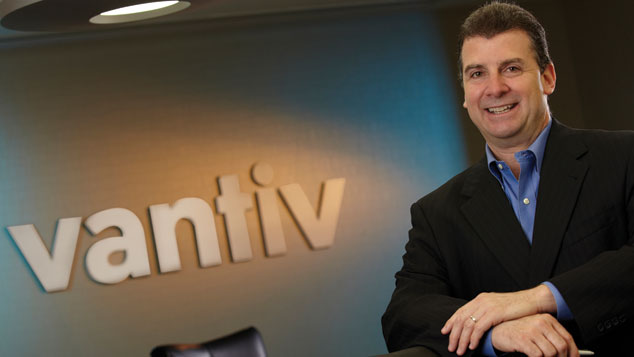
Vantiv’s takeover of Worldpay, the UK payments processor, makes strategic sense. But will shareholders benefit? Alice Gråhns reports.
“The global payments industry is growing and its champions must straddle the globe.” That explains US market leader Vantiv Inc’s $10.4bn takeover of Worldpay, its British counterpart, says Lionel Laurent on Bloomberg.com. A key prize for payments processors is the world e-commerce market, which will double to around $4trn between 2015 and 2020, according to McKinsey.
The combined entity, also called Worldpay, will be “a one-stop shop of global, online and offline coverage”, says Jim Armitage in the Evening Standard. Worldpay and Vantiv jointly process about $1.5trn of payments every year.
But is it a good deal for shareholders? There are few cost overlaps, says Laurent, and “the proposed co-CEO structure is awkward”. The companies expect to eliminate an annual $200m a year of pretax costs within three years of the deal, while one-time restructuring and integration expenses are pegged at $330m. Meanwhile, we have yet to hear how much the prospects for revenue growth and cross-selling are worth. “A lot will need to go right for Vantiv to justify the price.”
Worldpay shareholders seem to have done well, says Liam Proud on Breakingviews. They had two gripes during preliminary discussions last month: the price, and the fact that much of the offer comprised US-listed shares, which UK-focused fund managers may not own. But the implied valuation of almost 19 times Worldpay’s Ebitda earnings for the last 12 months “is hardly stingy”, while the company will now seek a secondary listing in London, solving the second problem. Shareholders should be content to nod the deal through.
Oh please, says Alistair Osborne in The Times. Dig deeper, and “the only obvious improvement” on July’s terms is that Worldpay will now have five of the 13 directors, up from four in July. That’s still only 38% of the board seats for a 43% stake. More broadly, “one simple fact” can’t be wished away: “Britain’s great fintech hope is getting taken out by a US rival” for a “skinny” premium.
Worldpay is “probably the better company” too, given its strong position in e-commerce: it handles five billion transactions worldwide in this sector every year. It’s a pity the superior Worldpay is “prey not predator”. But it hardly helped that it became 14% cheaper after the Brexit vote thanks to sterling’s slide against the greenback. Still, on the plus side, it gets to keep its name. “Not bad for a month’s negotiations – even if the alternative was the meaningless Vantiv.”
Telit: a classic Aim scandal
Telit Communications, a “once-hot ‘internet of things’ stock”, had the equivalent of a cold shower last week, says Áine Quinn and Beth Mellor on Bloomberg.com. The Aim-listed firm lost more than half its market value in days after its CEO Oozi Cats was linked to an old fraud case.
Media reports identified him as US fugitive Uzi Katz, who was indicted in a 1992 wire fraud case in Boston. A few days earlier, Telit, which makes the hardware allowing everyday items to be connected wirelessly, had reported disappointing first-half results.
Telit shares reached an all-time high of 372p in April, and Cats sold £24m of his shares a month later. The stock is now trading a little higher than the 140p shareholders paid at the 2005 flotation. “At first blush, the case has the ingredients of a classic Aim scandal,” says Lex in the FT. “One of these is a colourful boss. Mr Cats has potential here.” Another requirement is a company active in a hot sector: “Sure enough, Telit supplies components for the much-vaunted ‘internet of things.’” Strong profit growth accompanied by negative cash flow over the past five years was another red light.
Investors should keep in mind that occasional blow-ups are inevitable in a lightly regulated market that allows them to access risky start-ups more easily than other exchanges. “The lesson… is encapsulated in the old Scottish motto: Touch not the cat [without] a glove.”
City talk
• “Keith Hamill has been in more boardrooms than most people have had hot dinners,” says Kate Burgess in the FT. Now he is becoming chairman of Premier Foods, the maker of Mr Kipling cakes and Ambrosia custard. “It won’t be a cookie cutter job.” The firm is weighed down by debt. It snubbed a 65p-a-share approach from US-based McCormick last year, with chief executive Gavin Darby promising investors sales growth of 2% to 4%. Since then, Darby has warned on profits, “blaming everything from the price of butter and cream to currencies and weather”. The shares are now around 40p and “shareholders are restless”.
• “Nothing, it seemed, could shake the loyalty of the Co-op Bank’s customers,” says Nils Pratley in The Guardian. They stuck around despite lurid tabloid revelations about former chairman Paul Flowers and a series of funding crises. But the endless bad news may now finally be taking its toll: 2% of customers closed their current accounts in the first half of this year. Whether this was due to long-term weariness or competitive action is unclear, but it seems ominous. Once the bank was seen as competition for the big banks. Today, the Co-op Bank has just 95 branches and “is soon to be rebooted with a life-saving £700m capital injection”.
• “A break-up of the Prudential is a great silly-season favourite,” says Alex Brummer in the Daily Mail. But it’s not on the cards, even if some think the decision to merge the Pru’s heritage life business with M&G to create a £350bn more active fund manager “is a giant step in that direction”. This is simply about giving savers, especially those stuck with cash-Isas, more choices and “justifying a £250m spend on a new digital platform”. With this move, Prudential is simply emulating rivals such as rivals Standard Life Aberdeen and Aviva.